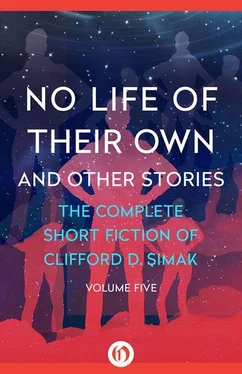Standing now, beside the iris bed, he looked around him and tried to imagine the kind of place this may have been—to see it with the eyes of his old ancestor, home from the wars and settled on acres of his own. There would still have been deer, for this old man had wanted hunting, and it had not been until the great blizzard of the early 1880s that the wild game of this country had been decimated. There would have been wolves to play havoc with the sheep, for in those days, everyone kept sheep. There would have been guinea fowls whistling in the hedgerows, for, in those days, as well, everyone kept guineas. And the chances were that there would have been peacocks, geese, ducks, chickens, wandering the yards. Good horses in the stable, for everyone in those days placed great emphasis on good horses. And, above all, the great pride in one’s own acreage, in the well-kept barns, the herds of cattle, the wheat, the corn, the newly planted orchard. And the old man, himself, he wondered—what kind of man was old Ned Parker, walking the path from the house up to the windmill. A stout and stocky man, perhaps, for the Parkers ran to stocky. An erect old man, for he’d been four years a soldier in the Union Army. Walking, perhaps, with his hands clasped behind his back, and head thrown back to stare up at the windmill, his present pride and glory.
Grandfather, Thomas asked himself, what happened? What is this all about? Did you feel belonging as I feel belonging? Did you feel the openness of this high ridge, the windswept sense of intimacy, the personality of the land as I feel it now? Was it here then, as well as now? And if that should have been the case, as it certainly must have been, why did you leave?
There was no answer, of course. He knew there would not be. There was no one now to answer. But even as he asked the question, he knew that this was a land loaded with information, with answers if one could only dig them out. There is something worth knowing here, he told himself, if one could only find it. The land was ancient. It had stood and watched and waited as ages swept over it, like cloud shadows passing across the land. Since time immemorial, it had stood sentinel above the river and had noted all that had come to pass.
There had been amphibians floundering and bellowing in the river swamps, there had been herds of dinosaurs and those lonely ones that had preyed upon the herds, there had been rampaging titanotheres and the lordly mammoth and the mastodon. There had been much to see and note.
The old black man had said look back, look back beyond the time of man, to the forgotten primal days. To the day, Thomas wondered, when each worshipping dinosaur had swallowed one stone encised with a magic line of cryptic symbols as an earnest that it held faith in a primal god?
Thomas shook himself. You’re mad, he told himself. Dinosaurs had no gods. Only men had the intelligence that enabled them to create their gods.
He left the iris patch and paced slowly up the hill, heading for the windmill, following the now nonexistent path that old Ned Parker must have followed more than a hundred years before.
He tilted back his head to look up at the spinning wheel, moving slowly in the gentle morning breeze. So high against the sky, he thought, so high above the world.
The platform of the well was built of hewn oak timbers, weathered by the years, but still as sound as the day they had been laid. The outer edge of them was powdery and crumbling, but the powdering and the crumbling did not go deep. Thomas stooped and flicked at the wood with a fingernail and a small fragment of the oak came free, but beneath it the wood was solid. The timbers would last, he knew, for another hundred years, perhaps several hundred years.
As he stood beside the platform, he became aware of the sound that came from the well. Nothing like a whistle, but a slight moaning, as if an animal somewhere near its bottom were moaning in its sleep. Something alive, he told himself, something moaning gently far beneath the surface, a great heart and a great brain beating somewhere far below in the solid rock.
The brains and hearts of olden dinosaurs, he thought, or the gods of dinosaurs. And brought himself up short. You’re at it again, he told himself, unable to shake this nightmare fantasy of the dinosaur. The finding of the heap of gizzard stones must have left a greater mark upon him that he had thought at first.
It was ridiculous on the face of it. The dinosaurs had had dim intellects that had done no more than drive them to the preservation of their own lives and the procreation of their kind. But logic did not help; illogic surged within him. No brain capacity, of course, but some other organ—perhaps supplementary to the brain—that was concerned with faith?
He grew rigid with anger at himself, with disgust at such flabby thinking, at a thought that could be a little better than the thinking of the rankest cult enthusiast, laced with juvenility.
He left the well and walked up to the track he had followed coming in.
He walked along it rapidly, bemused at the paths his mind had taken. The place, he thought, for all its openness, all its reaching toward the sky, all its geographic personality, worked a strange effect upon one. As if it were not of a piece with the rest of the earth, as if it stood apart, wondering, as he thought this, if that could have been the reason all the families left.
He spent the day upon the ridge, covering the miles of it, poking in its corners, forgetting the bemusement and the anger, forgetting even the very strangeness of it, glorying, rather, in the strangeness and that fascinating sense of freedom and of oneness with the sky. The rising wind from the west tugged and pulled at him. The land was clean, not with a washed cleanness but with the clean of a thing that had never been dirty, that had stayed fresh and bright from the day of its creation, untouched by the greasy fingers of the world.
He found the gaping cellar-holes of other farmhouses and squatted near them almost worshipfully, seeking out the lilac clumps, the crumbling remains of vanished fences, the still remaining stretches of earlier paths, now not going anywhere, the flat limestone slabs that had formed doorsteps or patios. And, from these, he formed within his mind the profiles of the families that had lived here for a time, perhaps attracted to it even as he found himself attracted to it, and who, in the end, had fled. He tested the wind and the highness, the antiseptic ancientness and tried to find within them the element of horror that might have brought about their fleeing. But he found no horror; all he found was a rough sort of serenity.
He thought again of the old lady in the rocking chair that day he had sat with her at tea in an old New England house, eating thin-sliced bread and butter. She was touched, of course. She had to be. There was no earthly reason she should want to know so desperately the details of the family line.
He had told her nothing of his investigations. He had reported every now and then by very formal letters to let her know he was still working on the project. But she would not know the story of the Parkers until he had put the manuscript into her clawlike hands. She would find some surprises, he was sure. No horse thieves, no gallows birds, but there had been others she could not have guessed and in whom she could take no pride. If it was pride that she was seeking. He was not sure it was. There had been the medicine-show Parker of the early nineteenth century who had been run out of many towns because of his arrogance and the inferiority of his product. There had been a renegade slave trader in the middle of the century, the barber in an Ohio town who had run off with the wife of the Baptist minister, the desperado who had died in a hail of withering gunfire in a Western cattle town. Perhaps, he thought, Aunt Elsie might like the desperado. A strange tribe, this branch of the Parkers, ending with the man who had drilled a well that could have loosed upon the countryside the spawn of ancient evil. And stopped himself at that. You do not know it for a fact, he sternly told himself. You don’t even have the smallest ground for the slightest speculation. You’re letting this place get to you.
Читать дальше












